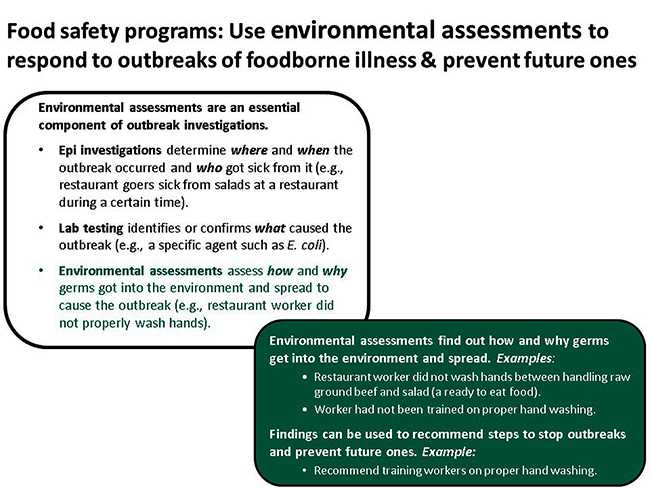What Are Environmental Assessments?
Environmental assessments are an important part of outbreak investigations. They provide the information needed to recommend effective short and long term interventions that stop ongoing foodborne outbreaks and prevent them in the future.
An environmental assessment of a foodborne illness outbreak determines how and why germs got into the environment and spread to make people sick. Food safety program officials typically conduct these assessments. In these types of assessments, they
- Look for clues in the food safety system to understand and address the outbreak’s environmental causes (also known as contributing factors and environmental antecedents)
- Involve people from different disciplines to assess all aspects of the food safety system
- Use a broad definition of the environment to include everything external to the host. For example, this definition includes air, food, water, animals, plants, and climate, as well as people and the social and built environments.

Foodborne illness is a significant problem in the United States.
- More than half of all foodborne illness outbreaks [PDF – 1.5 MB] in the United States are associated with restaurants, delis, banquet facilities, and schools and other institutions.
- CDC estimates that each year roughly 1 in 6 Americans (or 48 million people) gets sick, 128,000 are hospitalized, and 3,000 die of foodborne diseases.
- Many of these illnesses occur as part of a foodborne illness outbreak; 818 foodborne illness outbreaks were reported to CDC in 2013.
For more on environmental assessments, visit
- Environmental Assessment Definitions
- National Environmental Assessment Reporting System
- E-Learning on Environmental Assessment of Foodborne Illness Outbreaks
- Page last reviewed: August 24, 2017
- Page last updated: August 24, 2017
- Content source:


 ShareCompartir
ShareCompartir